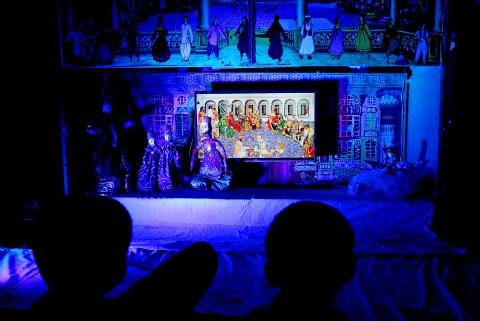In the narrow alleys of a poor neighborhood of Karachi, known for drugs, gang wars and low literacy rates, children are learning about peace, love and interfaith tolerance from string puppets.
As the curtains open on stage, a narrator tells the story of Sindbad the Sailor, a hero of Middle Eastern origin, and his journeys in which he meets people of different faiths, languages and religions — who often do not have much tolerance for one another.
“A man is dying and you guys are talking about castes,” the protagonist puppet rebuked a fellow puppet who did not want to save a drowning marionette because it belonged to a lower caste.

Photo: Reuters
“You should be ashamed calling yourself human beings,” Sindbad says. “Humans save humanity, not caste.”
Writer Nouman Mehmood said that the story came to mind when his group was conducting an education awareness campaign in some of the city’s poor neighborhoods.
They noticed religious and ethnic antagonism in the neighborhoods and decided to create a puppet show to spread a message of peace, tolerance and harmony.
Pakistan, an overwhelmingly Muslim country of more than 200 million people, has seen repeated attacks on churches, Hindu temples and Sufi shrines in the past few years by hardline religious groups and extremists.
Conservative religious schools are regularly blamed for radicalization, but they are often the only education available to millions of poor children, making alternative messages especially important.
“The basic thing is acceptance. You should have enough room to accept others regardless of whether he is a Christian, without considering whether he is a Hindu, without considering whether he is a Sikh,” Mehmood said.
Organized by the Thespianz Theatre, the show plans to travel to other poor Karachi neighborhoods after its run in the tough Karachi neighborhood of Lyari, and then to other provinces.
“There is the message that we should not interfere with others’ religions. We should help each other,” eighth-grader Adul Rahim Arshad said after the show. “If one deceives us, we should not deceive him back. Instead, we should help him.”

Republican US lawmakers on Friday criticized US President Joe Biden’s administration after sanctioned Chinese telecoms equipment giant Huawei unveiled a laptop this week powered by an Intel artificial intelligence (AI) chip. The US placed Huawei on a trade restriction list in 2019 for contravening Iran sanctions, part of a broader effort to hobble Beijing’s technological advances. Placement on the list means the company’s suppliers have to seek a special, difficult-to-obtain license before shipping to it. One such license, issued by then-US president Donald Trump’s administration, has allowed Intel to ship central processors to Huawei for use in laptops since 2020. China hardliners

Conjoined twins Lori and George Schappell, who pursued separate careers, interests and relationships during lives that defied medical expectations, died this month in Pennsylvania, funeral home officials said. They were 62. The twins, listed by Guinness World Records as the oldest living conjoined twins, died on April 7 at the Hospital of the University of Pennsylvania, obituaries posted by Leibensperger Funeral Homes of Hamburg said. The cause of death was not detailed. “When we were born, the doctors didn’t think we’d make 30, but we proved them wrong,” Lori said in an interview when they turned 50, the Philadelphia Inquirer reported. The

RAMPAGE: A Palestinian man was left dead after dozens of Israeli settlers searching for a missing 14-year-old boy stormed a village in the Israeli-occupied West Bank US President Joe Biden on Friday said he expected Iran to attack Israel “sooner, rather than later” and warned Tehran not to proceed. Asked by reporters about his message to Iran, Biden simply said: “Don’t,” underscoring Washington’s commitment to defend Israel. “We are devoted to the defense of Israel. We will support Israel. We will help defend Israel and Iran will not succeed,” he said. Biden said he would not divulge secure information, but said his expectation was that an attack could come “sooner, rather than later.” Israel braced on Friday for an attack by Iran or its proxies as warnings grew of

A prominent Christian leader has allegedly been stabbed at the altar during a Mass yesterday in southwest Sydney. Bishop Mar Mari Emmanuel was saying Mass at Christ The Good Shepherd Church in Wakeley just after 7pm when a man approached him at the altar and allegedly stabbed toward his head multiple times. A live stream of the Mass shows the congregation swarm forward toward Emmanuel before it was cut off. The church leader gained prominence during the COVID-19 pandemic, amassing a large online following, Officers attached to Fairfield City police area command attended a location on Welcome Street, Wakeley following reports a number